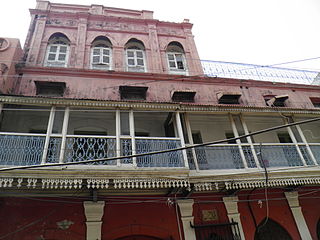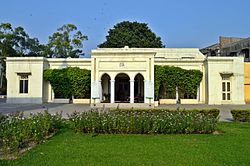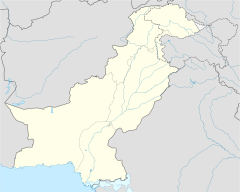
Lahore is the second most populous city in Pakistan after Karachi and 26th most populous city in the world, with a population of over 13 million. It is the capital of the province of Punjab where it is the largest city. Lahore is one of Pakistan's major industrial and economic hubs, with an estimated GDP (PPP) of $84 billion as of 2019. It is the largest city as well as the historic capital and cultural centre of the wider Punjab region, and is one of Pakistan's most socially liberal, progressive, and cosmopolitan cities. It is situated in the northeast of the country, close to the international border with India.

Greater Iqbal Park, formerly Minto Park, is an urban park located in the outskirts of the Walled City in Lahore, Pakistan. Before current renovations and expansion, its name was Iqbal Park.

Allama Iqbal Medical College is a public medical school in Lahore, widely regarded as one of the best medical institutions in Pakistan. Established in 1975, it is a public school of medicine, nursing and allied health sciences located in Lahore, Punjab, Pakistan. Jinnah hospital is attached to the college as a teaching hospital, which is housed adjacent to the college complex.

Arain are a large Punjabi agricultural tribe with a strong political identity and level of organisation, found mainly in the Pakistani provinces of Punjab and Sindh with a small population in parts of Indian Punjab, Uttar Pradesh and Uttarakhand.

The Tomb of Allama Iqbal, or Mazaar-e-Iqbal is a mausoleum located within the Hazuri Bagh, in the Pakistani city of Lahore, capital of Punjab province.

Javed Iqbal was a Pakistani philosopher and senior justice of the Supreme Court of Pakistan. He was internationally known for his acclaimed publications on philosophy of law and modern Islamic philosophy in international and national journals.
Zarb-i-Kalim is a philosophical poetry book of Allama Iqbal in Urdu, a poet-philosopher of the Indian subcontinent. It was published in 1936, two years before his death.

Aiwan-e-Iqbal is an office complex and monument in Lahore, Punjab, Pakistan under the administrative control of Ministry of Information, Broadcasting and National Heritage.

Iqbal Manzil is the birthplace of Muslim poet and philosopher Dr Muhammad Allama Iqbal (1877-1938). It is located in the heart of the city of Sialkot in Punjab province of Pakistan.

There are several modes of transport available in Lahore.
Walid Iqbal is a Pakistani politician, lawyer, law professor serving as a member of Senate of Pakistan from Punjab, Pakistan and the Chairperson of the Senate Committee on Human Rights.

Sir Muhammad Iqbal was a South Asian Muslim writer, philosopher, scholar and politician, whose poetry in the Urdu language is considered among the greatest of the twentieth century, and whose vision of a cultural and political ideal for the Muslims of British-ruled India was to animate the impulse for Pakistan. He is commonly referred to by the honorific Allama.
The Abdullah Gul Interchange, named after Turkish President Abdullah Gül, is an interchange of the Lahore Ring Road, giving access to the Allama Iqbal International Airport. The interchange was opened on April 1, 2010. It was completed at a cost of Rs. 2,275 million, in a record period of 7 months.
The following is a timeline of the history of the city of Lahore, Pakistan.
Prof. Yousaf Saleem Chishti, known as Yusuf Salim Chishti, was a Pakistani eminent scholar and writer. He was the interpreter and commentator of Allama Mohammed Iqbal's work and worked with him from 1925 to 1938 predominantly.

Iqbal Academy Pakistan(Urdu:اقبال اکادمی پاکستان) is an institute whose purpose is to study, promote, and disseminate the teachings of the poet and philosopher Allama Muhammad Iqbal. It was established by the Government of Pakistan, through the Iqbal Academy Ordinance No. XXVI of 1962.

This page list topics related to Muhammad Iqbal.













